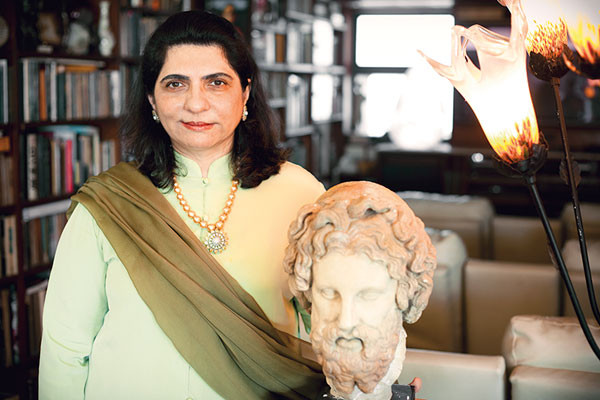The Art Of Life
She cares about your ovaries, your eggs and your fallopian tubes, amongst other things, if you are female. If you happen to be a man, she cares about what she dubs ‘the male factor’. She cares about whether your sperm looks healthy and strong, swims in a straight line, is firm-bodied and well-formed and whether you have any sperm at all. Dr Firuza Parikh, fertility expert of the last 20 years or more, is not worried, though, whatever she discovers. She is not a worrier by nature. In fact, she sleeps the sleep of the un-worried, every night, after long days, seven working days, every week. She would rather be a solver of problems than a worrier. However, if you are worried about getting pregnant, or rather, not getting pregnant, then you need to visit this feisty doctor. For Firuza has been responsible for the births of 5000 ART (Assisted Reproductive Technology) babies and would make herself responsible for yours – but only if you were finding it difficult having one.
Her newly published first book – The Complete Guide to Becoming Pregnant – firmly in hand, I enter the fertility centre at Jaslok Hospital and Research Centre, Mumbai. The place is as busy as a railway station but there are only women around. I count a couple of anxious male faces but no more. Firuza appears out of the melée in her white doctor’s coat and green cotton cap. She is un-fussed, a nucleus of calm. We wait for someone to vacate her cabin and then walk in for a quiet chat. An appropriate mother and child bust in white plaster, stares down at me next to a model of the female reproductive system. Photographs of babies line a wall and celebrity mother and Bollywood director, Farah Khan’s triplet’s romp framed on a wall. Awards, prizes and citations line the room, above head. A corner is devoted to statuettes of Ganesha and other deities.
This is indeed a woman like no other, I discover. ‘Assisted reproduction is about science and technology and Firuza is an accomplished and widely respected professional in this domain’, writes close friend, Nita Ambani in her Foreword to the book. Conquering infertility has become a battle of a lifetime for Firuza. Her book, which aims to enlighten infertile couples on their options without further waste of precious time, is simple to read, dotted with real-life stories, some humorous, others heart-wrenching and explains the various ‘test-tube procedures’ that play a vital role in the treatment of both male and female infertility. While IUI, IVF, ICSI, PGD, CAT make little sense to me, I venture, in sterile gown and cap, into the laboratory to view on the computer screen the injection of morphologically selected sperms. A visit to the genetics lab too thrills with the intricate work being done here.
A couple of days later, I am at the launch event of her book. The historic Convocation Hall of Mumbai University adds solemnity to the glittering evening. Husband, Dr Rajesh Parikh, a prominent psychiatrist, is busy making guests and friends comfortable. Bollywood superstar Aamir Khan mediates a conversation between Farah Khan who relates her experiences at assisted reproduction, and her doctor, Firuza. Farah reads too from her chapter in Firuza’s book. In the front rows sit industrialist Mukesh Ambani and Nita Ambani, matriarch Kokilaben Ambani, director Kiran Rao and columnist and novelist Shobhaa De. Close friends all and present to cheer her on in her work. While Nita pronounces the book, “A powerful tool of empowerment for families,” she adds prophetically, “Firuza’s best is yet to come….”
Excerpts from the interview…
How long did you take to write this book? Why did you write it?
The book took me literally nine months and then another three months to get everything in place with Random House. Almost 10 to 15 per cent of couples who are in the reproductive age face infertility at some point in their lives and sometimes they really don’t know how to go about things, where to turn to, since there is so much stigma attached to infertility even today, although it is much better say than 10 years ago. A woman’s productive career is short compared to a man’s. So this might serve as a pointer for their condition and also give hope that everything is not lost. Today, almost 90 per cent of infertility can be treated. I wanted this to be a happy book, to make the patients well informed.
I sat down and wrote every bit of it. It was easy in the sense that with so much experience, writing was not difficult. What was difficult was making it simple for the reader. I would snatch a little time in the latter part of the day or in the early morning or on a flight, I have completed three chapters on flights….
How did you get into IVF?
I have been in it for more than 20 years. I started with my Fellowship at Yale and then Jaslok Hospital invited us to start IVF; it was the first private hospital to do so. I started here in 1989, so now almost 22 years and more than 5,000 babies later, I have lost count.
What is IVF?
IVF is in vitro fertilisation where you actually isolate the egg from the woman’s body, isolate the sperm from the man, and do the various steps of fertilisaton in the petri dish. Then you go one step further with ICSI which is another much more advanced form of IVF where you actually complete the seven steps of fertilisation, starting with injecting the sperm straight inside the egg, clearing the egg first and putting it straight in. What I tell my couples is that IVF is a process, it is not a procedure. It starts with checking the woman’s tube, checking her hormonal profile, checking the man’s sperm, seeing the compatibility of the egg and the sperm, seeing if the woman is ovulating. What are the stresses? What are the environmental factors that are leading to infertility?
What are your other passions?
One passion that I have not been able to do of late is trekking, but now somehow the weekends are very occupied. My other passion is spending time with my children, since they are in different fields, taking time out to go and meet them. My daughter is in Florence, my son in Michigan, so Rajesh and I try to take time off. We have been going on quite a lot of safaris as well. We have been to Africa, now over the last five years, practically every year, always with Nita and Mukesh (Ambani). We have been to Botswana, Zimbabwe, Tanzania, South Africa….
I like to watch movies but I am not a movie buff. I read a lot. My relaxation is reading my science books. I spend an hour reading every day, anywhere. I like to be well informed about my subject, which may be boring for others. Besides, I am editor-in-chief of the Indian edition of Fertility And Sterility.
Tell me about your work in Kashmir….
Kashmir is very interesting. We used to get a lot of patients from Srinagar and Kashmir who came here for treatment. One of my patients – who is a doctor and who had conceived with us with IVF – asked if I would come and give a talk to doctors in Kashmir and see a few patients. I thought why not, I would keep two days aside, one for the talk, one to relax and come back. But after my talk I realised that ‘some patients’ turned out to be about 100 patients. So, as I left for the airport, I had to come back since some patients had come all the way from LOC. I felt that there is such a big need here, and everyone cannot come to big metropolises so I went again the next month and the next and have been going regularly. Over the last four years, we have set up a full-fledged IVF centre so that we help the people there locally. I find it very rewarding. The women there have a lot of incidents with premature menopause and it is a big problem.
Did your childhood in any way prepare you for this life?
I never imagined that I would do this kind of work. Always in my mind as I grew up I thought I would be a doctor. The real passion started when Louise Brown (the first test-tube baby) was born. I was doing my internship at that time and this was like a miracle of life. That’s when I thought that this is something that I would like to pursue. Rajesh at that time was also at Hopkins. He was doing his fellowship in neuropsychiatry. And I was doing a fellowship at Yale. We were very clear that we wanted to imbibe all the knowledge and come back to India.
In my childhood, I had a science teacher who would love to give us small quizzes and talk about a particular disease. So my biology teacher was my main inspiration. One day, she told me, ‘I think you will become a doctor’. Way back in the seventh standard!
What do you worry about most?
I am not a worrying person. I am a very solution-oriented person. When I go to bed, I sleep within 20 seconds of my head hitting the pillow. When the children were small I used to worry that I could not give them enough time. But I always had Rajesh’s support; he would be there on days that I was working. But I never worried as such for the children. Today, I feel that because I could not give them time, they have become their own individual people, solving their own issues and problems whenever they arose.
What are your eccentricities?
I have one eccentricity…well, I don’t know if it is an eccentricity. Anything that I have to do today, I cannot leave for tomorrow. Like paying a bill. Whatever paperwork is there has to be completed the same day. It is a terrible habit because if there is anything lying here, I have to clear it. See my email; three new mails have come since I cleared my mails. Now these will bug me until I have answered them. I am a calm but impatient person. If things don’t fall in place as I want them to, that drives me a little crazy.
Do you advise new mothers to preserve the cord blood for stem cells?
It is very important to keep the stem cells because it is like a biological insurance. The cord blood has lots of stem cells and as you know stem cells are pluripotent or total-potent which means that they can divide into other cells of the body. So this is something that can be used for that individual when he grows up, or can be used later on for the siblings…. It’s something worthwhile considering.
Do you ever get the feeling that you are playing God?
There are times when people will say, you are God. That is a very dangerous thing for a doctor to think. After all, we are vulnerable, we are human beings; we should be as humble as possible. We should never think of success. If there is a challenging couple that I cannot help, that will drive me rather than thinking that I have succeeded in whatever I do.
After so many years, how do you feel when a baby is born?
It is always the same experience that I had the first time. When somebody gets pregnant, there is so much wonder for nature. There is so much amazement because when we see the baby, it is a two-cell embryo, a two-cell individual and then it goes through all the stages for nine months. There is a sense of wonderment and amazement every time that somebody has a baby or conceives.
Do you ever get the time to shop?
I love nice sandals. The only thing I collect is shoes and sandals. Simple things, more for comfort than anything else…we have to be comfortable.
Nita Speak
Dr Firuza Parikh’s close friend Nita Ambani says:
“To me, she is more than a medical leader, a friend and godmother to my three children. She has been working quietly for two decades and I think that the best is yet to come. She has rendered fantastic service in Kashmir. Mukesh and Rajesh were together in St Xavier’s College in Mumbai and we have known Firuza and him socially for more than two decades. She is wonderful, she is always there when I need her and is the most genuine person I know. We are soul sisters.”
Farah Speak
Bollywood director Farah Khan has written about her own personal experience with IVF in The Complete Guide to Becoming Pregnant. Dr Firuza Parikh’s hospital room is hung with photographs of Farah’s now three-year-old triplets at various stages, since birth
“I am eternally grateful to her. I have had IVF and she has given me my three beautiful kids. I was 43 when I had the babies and am like a patron saint to older women. I must have sent at least 300 women to her. A lot of women just give up after 30 but it’s all in the mind. I manage pretty well with three kids. There is an army of help at home but I am a hands-on mother. I am a real ‘Soccer Mom’, taking them to parties, to the beach, the mall. If I have a longish shooting, I take them there with me, too.
“When you go to Firuza, you just know you are in good hands. She always has a gut feeling about whether you will get a baby or not. And, usually, she is always right…!”
Related posts from Verve:
Verve Trending
Sorry. No data so far.
us on Facebook to stay updated with the latest trends







